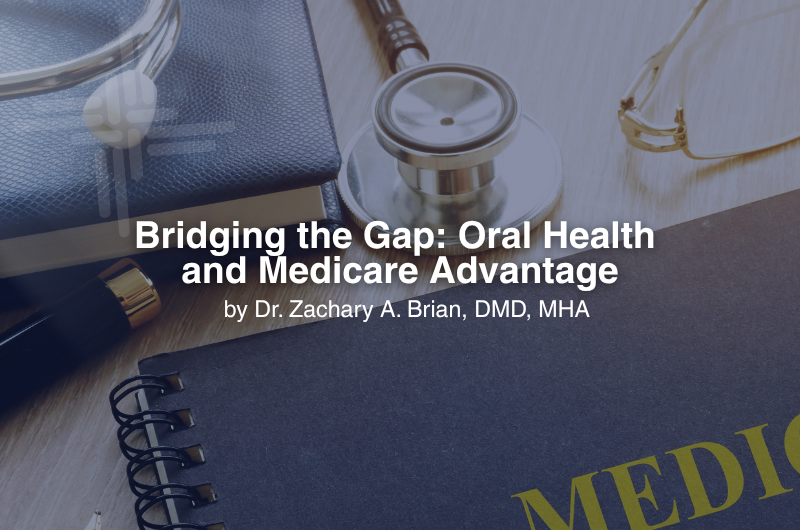What Medicare Advantage Is Missing — and Why Oral Health Must Be Part of the Star Rating System and Future

Oral health is essential. Let’s build a system that finally treats it that way.
By Zachary Brian, DMD, MHA
Fellow, Santa Fe Group | Coalition for Oral Health Policy (COHP)
Several years ago, I sat at my grandmother’s kitchen table as she tried to make sense of her Medicare Advantage (MA) paperwork. She was flustered. Overwhelmed. Defeated.
Like so many older adults, she had selected her MA plan because it included dental benefits — a long-overdue step toward care she’d gone without for years. But when the time came to understand what was actually covered, the answers were elusive. The language was vague. The provider options were unclear. And what seemed like a helpful benefit felt, instead, like another barrier.
What struck me most wasn’t just the confusion — it was the resignation. She’d done everything right and still felt like she was navigating a system that wasn’t built for her.
Sadly, fast forwarding to 2025, not much has changed.
Millions of Medicare beneficiaries today still face the same frustration my grandmother felt. Dental benefits are often marketed as part of the value proposition in MA plans, but there’s no guarantee they’re meaningful, accessible, or even sufficient. Why? Because oral health isn’t part of the MA Star Rating system — the very system that drives how quality is defined, measured, and improved.
A Pivotal Opportunity to Modernize MA
Today, nearly 70% of Medicare beneficiaries are enrolled in MA plans, and dental benefits are often central to how those plans are marketed. But while the promise of oral health coverage exists, the tools to ensure it delivers real value remain underdeveloped.
Why? Because oral health is not yet included in the Medicare Advantage Star Rating system — CMS’s primary mechanism for measuring and rewarding plan performance.
This presents not just a gap, but a tremendous opportunity.
The Star Rating system helps guide consumer choice, informs bonus payments, and encourages continuous improvement across MA plans. It’s a system designed to elevate what matters. But oral health, despite its direct and well-documented connection to overall health, is not yet part of that equation.
For a service area that touches nearly every beneficiary and intersects deeply with overall health, this omission is more than a gap — it’s a structural failure.
Oral Health Is Overall Health
Let’s be unequivocal: the evidence base connecting oral health to systemic health is well-established and growing stronger every year.
Oral diseases don’t just affect the mouth. They contribute to and worsen chronic illnesses like diabetes, cardiovascular disease, and respiratory conditions. They increase the risk of hospitalizations and emergency visits. Poor oral health has been associated with cognitive decline, including Alzheimer’s disease. And the burden of disease is disproportionately high among low-income older adults and racially and ethnically diverse populations.
As CMS rightly notes in its proposed 2026 Physician Fee Schedule, periodontal disease may even be a modifiable risk factor for dementia. Yet, we lack the structural accountability to translate that science into practice within Medicare Advantage.
The consequences are not hypothetical. Medicare spends over $520 million each year on dental-related emergency department visits — most of which are preventable. These costs are borne by the system, but the toll is personal: pain, delays in care, poorer quality of life.
Dental benefits exist in many MA plans. But in the absence of measurement, we don’t know if they’re working. And we don’t have the data we need to improve them.
When You Don’t Measure Quality, You Can’t Improve It
In health care, what gets measured gets managed. That’s the entire premise of the Star Rating system. By tying quality to performance incentives, CMS has created an ecosystem where plans compete on outcomes, not just marketing.
But when it comes to oral health, we’re flying blind.
Without standardized reporting requirements or quality measures, we can’t:
- Compare plan performance on dental access or outcomes
- Hold plans accountable for misleading benefit structures
- Ensure dental networks are adequate and equitable
- Track disparities across income, race, geography, or chronic disease
- Align dental care with other aspects of value-based care
This harms both patients and plans. Beneficiaries often select plans assuming dental care will be comprehensive, only to face unclear cost-sharing, network limitations, or limited covered services. And plans that are truly delivering high-quality, accessible oral health services receive no recognition or competitive advantage.
If we want to strengthen the integrity of MA plans and ensure they deliver on their promises, oral health must be brought into the same quality framework as the rest of care. It’s pure common sense.
A Clear Path Forward — And a Willing Partner
The good news is that CMS doesn’t need to start from scratch. The infrastructure exists. The platform is built. The clinical evidence is clear.
What’s needed now is integration — and intention.
At the Coalition for Oral Health Policy (COHP), we don’t intend to focus on critique, but help seize a profound opportunity. CMS has a chance to lead the next evolution of Medicare Advantage by ensuring that oral health care is measured, improved, and equitably delivered.
We stand ready to help. COHP, as a policy action initiative of the Santa Fe Group, brings deep expertise in oral health policy, workforce development, systems integration, and health equity. We are here not to burden, but to partner.
Together, we can make the next version of MA stronger, smarter, and more complete.
Five Key Recommendations to Close the Gap
- Integrate oral health quality measures into the MA Star Rating system.
CMS should adopt condition-linked measures, such as the percentage of beneficiaries with diabetes or cardiovascular disease who receive at least one oral health visit and preventive service each year.
- Standardize dental benefit transparency across plans.
All MA plans should be required to clearly report what dental services are covered, cost-sharing structures, annual limits, and network participation. This will help beneficiaries make informed choices and protect against deceptive marketing.
- Strengthen network adequacy standards.
Plans must demonstrate access to dental providers within reasonable geographic distance and wait times. Cultural and linguistic competency should also be assessed to support diverse populations.
- Incorporate consumer experience measures related to dental care.
CMS should evaluate how well beneficiaries understand, access, and utilize their dental benefits — including satisfaction with plan responsiveness and clarity of information.
- Invest in dental workforce infrastructure.
Quality improvement isn’t possible without an adequate provider workforce. Federal investment is needed to ensure that dental professionals are available in high-need communities, particularly rural and underserved areas.
Building a Health System That Reflects What We Know
Too often in health policy, we wait for gaps to become crises. But this is a rare case where the gap is already visible, the solution is within reach, and the alignment of science, policy, and need is unusually strong.
Including oral health in the MA Star Rating system won’t just protect consumers. It will elevate plan performance. It will reduce unnecessary spending. And it will send a clear message that oral health is not secondary, but central, to aging with dignity and health.
An Invitation to Partner
Change requires more than insight — it requires collaboration. At COHP and the Santa Fe Group, we are committed to working alongside CMS and its partners to ensure this transformation is both evidence-based and operationally feasible.
We believe this is CMS’s moment to lead boldly. And we’re here to support that leadership, with technical expertise, policy vision, and a shared commitment to strengthening Medicare for those who depend on it most.
Together, let’s measure what matters. Let’s bring oral health into the light. And let’s build a system that reflects the truth we’ve always known:
Oral health is overall health. It’s time our systems treated it that way.
About the Author
Zachary Brian, DMD, MHA, is a health policy strategist and Fellow with the Santa Fe Group. He serves as co-lead of the Coalition for Oral Health Policy (COHP), an initiative of the Santa Fe Group aimed at driving systems change through policy advocacy. Dr. Brian is also Associate Professor, Director of the Dentistry in Service to Community (DISC) program, and is the Founding Director of the Program for Oral Health Policy at the University of North Carolina at Chapel Hill Adams School of Dentistry.

